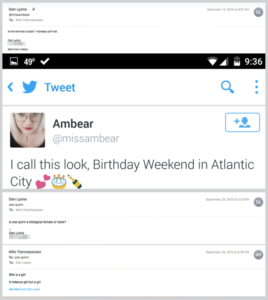The Common Crawl is a project that has been crawling the web and making an open corpus of web data from the last 7 years available for research. There crawl corpus is petabytes of data and available as WARCs (Web Archives.) For example, their 2013 dataset is 102TB and has around 2 billion web pages. Their collection is not as complete as the Internet Archive, which goes back much further, but it is available in large datasets for research.
Oculus and our troubles with (virtual) reality
Will the arrival and popularity of Oculus Go and other VR systems make us think differently about alternative realities and so-called alternative facts?
Matthew Flisfeder from the University of Winnipeg has penned a nice essay for the The Conversation on Oculus and our troubles with (virtual) reality. He starts with the new Oculus Go that brings virtual reality hardware down in cost to US $199. He then goes on to talk about fake news and alternative facts and how the portrayal of VR in popular media (Neuromancer, Matrix) has generally questioned the impact of the new media as it creates an alternative or fake reality. He also makes an interesting connection between fake news, social media and VR. Much of the discussion of the distorting power of fake news has focused on social media like Facebook and Twitter and how they seem to have manipulated the political reality for many. Facebook has become the site of internet reality for so many that when it distorts things it is people’s news of the world that is distorted. Facebook has ceased to be just one web site among many for the many becoming the platform for reality that frames what can be reality. Which raises the question of what they will do the VR hardware they control? How does the Oculus Go fit with Facebook? Could Facebook become the operating system a social reality you experience virtually? Could it become so immersive you don’t bother with alternatives?
Quit Your Technology Job and Get a Humanities Ph.D.
Stanford has put up a video of a talk on why you should Quit Your Technology Job and Get a Humanities Ph.D.. The talk is by Dr. Damon Horowitz who did just that. He quit doing AI and got a Ph.D. in philosophy. He argues that it has given him perspective on what AI can and can’t do, in addition to helping him think about his life and some of the things that make him uncomfortable about the tech world. It isn’t a ground breaking talk, but it is delivered with humour and addresses technology folk where it matters. Are you really that happy with your job and the hype around what you do?
Thanks to Humanist for this.
Nazis as the bad guys in videogames? How is that controversial?

In response to the US president, Wolfenstein’s marketing used his own words to market the game: “Make America Nazi Free Again”, “There is only one side”, “These are not ‘fine people’”, and so on. Many of his supporters have taken exception to this, decrying the notion that Nazis support the current occupant of the Oval Office. Unfortunately, the fact that white supremacists and actual Nazis support Trump and march openly in America doesn’t help their claims.
The Guardian and others have stories about how the marketing of Wolfenstein II: The New Colossus has angered Trump supporters: Nazis as the bad guys in videogames? How is that controversial? The issue is partly how Wolfenstein adapted Trump’s slogan “Make America Great Again.” Alt-Right gamers would like games to not be political, but they always have been; it’s just that certain demographics weren’t bothered by the politics before.
It is also worth noting the reference in the game title to the poem by Emma Lazarus at the base of the Statue of Liberty titled The New Colossus. I knew the famous line about “Give me your tired, your poor …”, but not the whole poem that starts:
Not like the brazen giant of Greek fame,
With conquering limbs astride from land to land;
Here at our sea-washed, sunset gates shall stand
A mighty woman with a torch, whose flame
Is the imprisoned lightning, and her name
Mother of Exiles. …
The larger story is how the gamergate community began to affiliate with the alt-right. Motherboard has a story about the shift in the r/KotakuInAction (KiA) subreddit.
So where does that leave Gamergate? Some people within the community are embracing the alt-right, others are peeling off in disgust, and most, it seems, continue to deny the link vehemently while paradoxically allowing that ideology to supplant Gamergate’s identity.
Cross, who even some Gamergaters would now agree was right about the nature of the movement from the very beginning, thinks that it’s going to be completely absorbed by the greater alt-right, and that this process has already begun with KiA essentially becoming a sub forum of r/The_Donald. The standard around which Gamergate organized—fighting for video games—is no longer the driving force behind KiA.
Facebook and American Democracy
The Atlantic has a good article on What Facebook Did to American Democracy by Alexis C. Madrigal (Oct. 12, 2017). What is interesting is how we assumed that the net and social media could affect things and that is would naturally benefit the left.
The research showed that a small design change by Facebook could have electoral repercussions, especially with America’s electoral-college format in which a few hotly contested states have a disproportionate impact on the national outcome. And the pro-liberal effect it implied became enshrined as an axiom of how campaign staffers, reporters, and academics viewed social media.
The story of networked politics seems to be that of tactics being developed by the left and promoted as democratizing and inclusive that are then reused by the right. It is also the story of how Facebook decided to own news and fake news. They created filter bubbles so that none of knew what the other was thinking.
An important article. Read.
BuzzFeed on Breitbart courting the alt-right
Screen of emails from Dan Lyons
Buzzfeed News has an article on Here’s How Breitbart and Milo Smuggled Nazi and White Nationalist Ideas Into The Mainstream. The article in based on a cache of internal Breitbart emails and mostly deals with what Milo Yiannopoulos was up to.
From this motley chorus of suburban parents, journalists, tech leaders, and conservative intellectuals, Yiannopoulos’s function within Breitbart and his value to Bannon becomes clear. He was a powerful magnet, able to attract the cultural resentment of an enormously diverse coalition and process it into an urgent narrative about the way liberals imperiled America. It was no wonder Bannon wanted to groom Yiannopoulos for media infamy: The bigger the magnet got, the more ammunition it attracted.
Part of the story also deals with some “liberal” journalists who apparently were emailing Milo like Dan Lyons. It just get more and more sordid.
Many of those who wrote Milo seem to be disgruntled people who feel oppressed by the “political correctness” of their situation, whether in a tech company or entertainment business. They email Milo to vent or pass tips or just get sympathy.
Inauguration of a new degree at Bologna
From Humanist I found out that the University of Bologna, one of the oldest universities in the world, is inaugurating a degree in Digital Humanities and Digital Knowledge (DHDK). The official web site for the two year MA is here. The programme will be in English and the Programme Director is Dr. Francesca Tomasi.
I love the idea of an inauguration of a programme. From the programme of the inauguration, it looks like a nice set of events/talks too.
Congratulations to Bologna!
Canadian Social Knowledge Institute
I just got an email announcing the soft launch of the Canadian Social Knowledge Institute (C-SKI). This institute grew out of the Electronic Textual Culture Lab and the INKE project. Part of C-SKI is a Open Scholarship Policy Observatory which has a number of partners through INKE.
The Canadian Social Knowledge Institute (C-SKI) actively engages issues related to networked open social scholarship: creating and disseminating research and research technologies in ways that are accessible and significant to a broad audience that includes specialists and active non-specialists. Representing, coordinating, and supporting the work of the Implementing New Knowledge Environments (INKE) Partnership, C-SKI activities include awareness raising, knowledge mobilization, training, public engagement, scholarly communication, and pertinent research and development on local, national, and international levels. Originated in 2015, C-SKI is located in the Electronic Textual Cultures Lab in the Digital Scholarship Centre at UVic.
Skinner on his Teaching Machine and programmed learning
From Teaching in a Digital Age by A. W. Bates I came across this 1954 video of Skinner explaining his Teaching Machine inspired by behaviourism. The machine runs a paper script, but it isn’t that different from the computer based drill training today. You get a question, you write your answer, and you get feedback.
Later we got machines that projected slides and hypertext systems. See Programmed Instruction and Teaching Machines.
Hey, Computer Scientists! Stop Hating on the Humanities
Wired Magazine has a nice essay on Hey, Computer Scientists! Stop Hating on the Humanities. The essay by a computer scientist argues that CS students need to study the ethical and social implications of what they build. It can’t be left to others because then it will be too late. Further, CS students should be scared a little:
Professors need to scare their students, to make them feel they’ve been given the skills not just to get rich but to wreck lives; they need to humble them, to make them realize that however good they might be at math, there’s still so much they don’t know.

